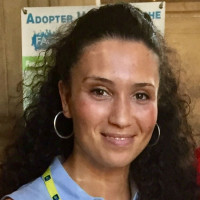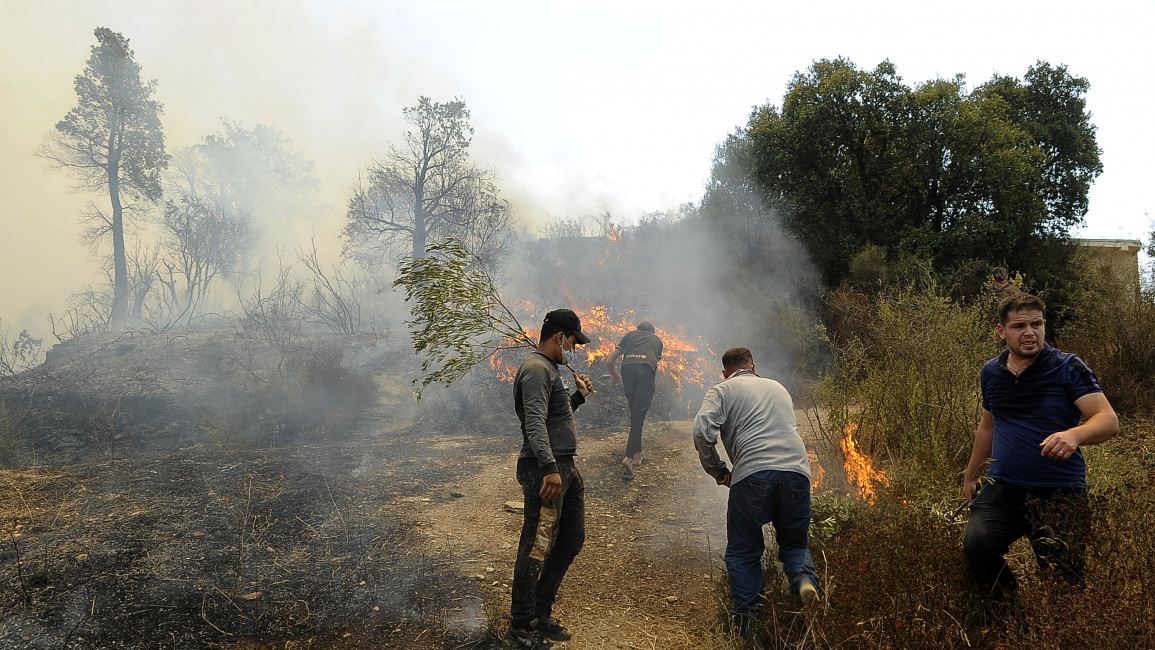
Algerians step up as their leaders play the wildfire blame game
Algerians learned long ago that in times of crisis, people power is the only solution. This has been aptly captured in the response of thousands across the country to the devastating forest fires which have recently spread across 18 provinces in Algeria.
The fires broke out on 9 August, and for the days that followed, around 100 blazes took the lives of at least 90 people, while burning homes, land, and agriculture. Tens of thousands of hectares of forest have been destroyed, especially in the Kabylie region.
The General Directorate of the Civil Protection (DGPC) reported on 13 August that 38 of the active fires were burning around Tizi Ouzou, one of Algeria's largest cities located in Kabylie. Consequently, this area became a focus for communities across Algeria who mobilised overnight to support inhabitants and attempt to extinguish the fires.
|
|
Videos circulating on social media show hundreds from towns and cities organising people to help put out the fires and aid locals who lost their homes and needed urgent medical help. Those with considerable online platforms have sent out mass calls for people to donate funds and resources such as medication, food, sanitary products and water.
The touching scenes of solidarity and a strong sense of empathy expressed through action on the ground have lifted the spirits of many Algerians, despite a low national mood. Fires, coupled with the sudden rise of Covid-19 cases and deaths, a dire and worsening economic reality, and a regime that has done little to improve the situation, have placed a considerable weight on the shoulders of ordinary Algerians. Yet, the people have not sat idly by waiting for things to pass, they have taken matters into their own hands.
The fires in Algeria are no trend
— NorthAfrica (@NAfricanthings) August 17, 2021
Keep on sending help and support
Prayers are sent to those in dire need pic.twitter.com/seosiYaIz8
Scenes of young men beating the raging fires with branches, wearing no protective gear but facing the flames with conviction have left people around the world in awe, especially as some brave volunteers have tragically lost their lives in the process.
The failure of the state
From the onset of the fires, it was clear that the regime would yet again fail its people. As political leaders stood idly by, criticism mounted, especially as the scale of coordinated aid and rescue campaigns by civilians grew. People with much less power, money, and machinery helped limit the scale of the disaster by responding immediately with what they had.
"From the onset of the fires, it was clear that the regime would yet again fail its people"
"Since yesterday, we have not seen a single police officer!" noted one volunteer. "The only things we have seen are the helicopters above and firefighters, but no one came and instructed or helped us evacuate," he added.
The neglect of the state goes deeper than a failure to supply adequate materials to put out the fires or help those fleeing affected areas.
In reality, while these fires are new in scale, wildfires are not uncommon in Algeria. Many, therefore, have asked why there was a lack of infrastructure or equipment, including firefighting technology and amphibious aircraft, to deal with such scenarios. Considering the worsening impacts of global warming and numerous warnings by experts, the sudden spread of Algerian fires should come as no surprise.
Instead, the regime relied on its usual method of blaming anyone but itself.
President Tebboune's response was frankly humiliating to the state and insulting to the people. The cause for the crisis, explained the president in a national address, was arsonists. He proceeded to announce that 22 people had been arrested in connection to this claim.
Une murale réalisé par l'artiste Mekky Deffas en l'honneur de Djamel ben Ismail à Miliana.
— Mehdi (@Mehdidjr) August 17, 2021
Insta : mekky_dfs
🎥 : @khaleddrareni pic.twitter.com/L94c3msmXl
[Tweet translation: A mural by the artist Mekky Deffas in Miliana honouring Djamel ben Ismail.]
A chorus of officials has echoed the line that the fires were a criminal act. Prime Minister Aymen Benabderrahmane stated that investigations "have proven that the starting points of these fires were carefully chosen to cause the largest possible losses". Interior Minister Kamel Beldjoud blamed "criminals filled with hatred against our country".
The regime also levelled accusations against Berber separatists, namely the Paris-based Movement for the Self-Determination of Kabylie (MAK), as well as Islamo-conservative Rachad movement, founded in London. Yet, no evidence has been offered to the public to back up such claims against these groups which the state classified as "terrorist organisations" in May.
The regime also blamed MAK following the tragic public lynching of artist and activist Djamel Ben Ismail, who was attacked after being falsely accused of starting the fires. In fact, Ben Ismail had travelled to the Kabylie region to help put out the fires.
"The regime relied on its usual method of blaming anyone but itself. The cause for the crisis, explained the president in a national address, was arsonists"
However, the divisive narrative launched by Tebboune and his ilk has caused a public outcry, demonstrating that Algerians no longer accepted such manipulative tactics.
Unbelievably, the president also accused Morocco of having some involvement in the fires: "The incessant hostile acts perpetrated by Morocco against Algeria have necessitated the review of relations between the two countries and the intensification of security controls at the western borders."
It is ironic that the regime so insistently pointed the finger of blame abroad to explain the catastrophic fires, while it has depends so heavily on support through the supply of aircraft from other nations including France, Spain, and Switzerland.
"We must stay united! The Algerian state is indivisible and so are the people," announced Tebboune. There is some truth in the president's words, however, the two elements are only linked because they function in contradiction to one another:
The indivisibility of the people is rooted in their two-year struggle, started in February 2019, demanding the end of this neglectful and violent regime. It is one of the reasons so many were able to mobilise and respond to the fires so quickly, without hesitation and without the expectation that the regime would do anything.
People have learned, through organising and marching, to rely only on themselves.
The people of Algeria are demonstrating in practice that they are not only capable but are already leading their country.
Malia Bouattia is an activist, a former president of the National Union of Students, and co-founder of the Students not Suspects/Educators not Informants Network.
Follow her on Twitter: @MaliaBouattia
Have questions or comments? Email us at: editorial-english@alaraby.co.uk
Opinions expressed here are the author's own, and do not necessarily reflect those of her employer, or of The New Arab and its editorial board or staff.

![Burned houses amidst charred trees in the Kabylie region on Algeria on 11 August, 2021. [Getty]](/sites/default/files/styles/medium_16_9/public/2021-08/GettyImages-1234624060.jpg?h=80accfed&itok=973aeO78)

![Minnesota Tim Walz is working to court Muslim voters. [Getty]](/sites/default/files/styles/image_684x385/public/2169747529.jpeg?h=a5f2f23a&itok=b63Wif2V)




